- Home
- Technical Cooperation Projects
- Index of Countries
- Africa
- Ghana
- Project for Improvement of Maternal and Neonatal Health Services Utilising CHPS System in the Upper West Region
- Project Activities
- Output 2: Systems for Maternal and Neonatal Health service strengthened
Project Activities
Output 2: Systems for Maternal and Neonatal Health service strengthened
Clarification of performance standards and development of a monitoring system
The previous project helped establish a monitoring system to supervise and support CHO activities called facilitative supervision (FSV) to strengthen CHPS implementation. The main characteristics of the FSV system are as follows.
- FSV is a comprehensive monitoring system covering all the vertical levels, i.e., region–district, district–sub-district, sub-district–CHPS, and CHPS–community health volunteers.
- FSV utilises standardized procedures and tools and makes it possible to compare trends in performance.
- FSV has periodic monitoring and feedback and makes it possible to share issues and take timely actions.
Health facilities in the Upper West Region did not have a Performance Standard (PS) for maternal and newborn care at each level. Therefore, the Project helps to define the PS and revise existing FSV system for monitoring and improving the implementation of maternal and newborn care service. The PS consists of the following five areas: 1) managerial areas; 2) quality improvement of the workplace; 3) service delivery; 4) referral and feedback; and 5) monitoring and supervision system. The Project modifies the FSV tools and manuals, conducts training for health personnel at each level, and helps implement the supervision through monitoring.
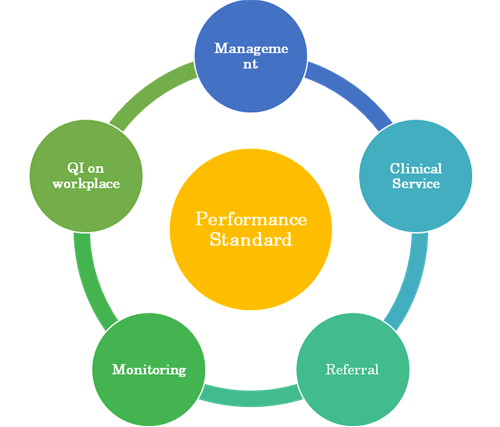 Area of Performance Standard
Area of Performance Standard
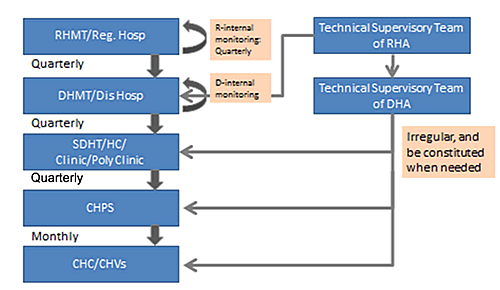 Structure of FSV
Structure of FSV
Strengthening the Referral System
Referral is the process of transferring severe patients to higher-tier health facilities and send them back to lower-tier health facilities for continuous treatments; the latter part is called counter-referral.
In Ghana, delivery is done in health centres and hospitals and Postnatal Care (PNC) at CHPS have been regarded as an act of counter-referral.
The guidelines of the referral system in Ghana was formed recently. The system in the Upper West Region faces many difficulties including the following: health personnel tend to fail in filling out the referral form fully and correctly; records of referral and counter-referral are insufficient because of the lack of a standardized referral register; counter-referral forms tend not to reach lower-tier health facilities; making continuous treatment impossible; health facilities store the referral forms improperly; means of transportation are not secured; lack of contact with receiving facilities; and postpartum mothers and newborn babies do not come to health facilities for PNC.
These difficulties lead to many further problems including the following: delays in referral and treatment of patients who have difficulties in pregnancy and delivery; interruption in treatment; and failure to grasp the current status of patients due to the lack of data.
In light of the problems above, the Project conducts activities including the following: 1) introducing and establishing referral tools (referral register and referral stamp); 2) informing all health facilities of the referral system and procedures; and 3) conducting training for health personnel aimied at functional improvement of referral coordinators.
The PNC stamp is used for entering expected and actual dates of PNC and facility names in the maternal handbook, by which mothers are encouraged to remind their PNC date through counter-referral.
The referral coordinator is in charge of information management and arrangement of referrals and counter-referrals through such tasks as contacting the receiving facility, securing means of transportation, sending and receiving the referral form, and managing the referral register. The placement of the referral coordinator is proceeding in each hospital and district health management team, but the post is not fully functional yet. This situation needs further improvement.
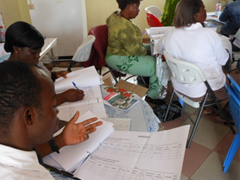 Training on how to use the referral register
Training on how to use the referral register
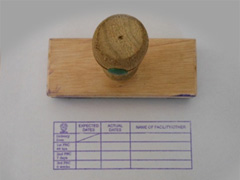 PNC stamp
PNC stamp
Strengthen Maternal, Neonatal, Death Audit (MNDA)
The Project ultimately aims to reduce maternal and neonatal mortalities in the Upper West Region. At health facilities in Ghana, the maternal and neonatal death audit (MNDA) is conducted to reduce such deaths through improving health services and strengthen IEC activities based on the analyses of causes and contributing factors to such deaths.
The causes of maternal deaths in the Upper West Region include direct obstetric causes (e.g., haemorrhage, and pregnancy-induced hypertension) as well as indirect causes (e.g., malaria, and HIV/AIDS). Furthermore, the delay in seeking care caused by traditional beliefs and social factors, the delay in transporting the woman or the baby to a health facility because of lack of transport or money, and the delay in providing appropriate medical care because of the shortage of such factors as personnel, drugs, and blood, cause such deaths. Therefore, the reduction of maternal and neonatal deaths requires a comprehensive approach both at the community and facility levels. The Project supports activities at the community level for IEC and improves service delivery through training health personnel. However, it is urgent to improve its medical services at the hospital because that is where most deaths occur.
The Project strengthens analysis, action planning, and their implementation based on MNDA through capacity building of the regional MNDA core team members and zonal coordinators and hospital MNDA and quality improvement teams. The Project also strengthens on-site monitoring activities by regional and zonal coordinators to ensure that continuous improvement of services is taking place to prevent unnecessary maternal and neonatal deaths.
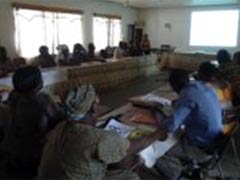 MNDA Workshop
MNDA Workshop
- About JICA
- News & Features
- Countries & Regions
- Our Work
- Thematic Issues
- Types of Assistance
- Partnerships with Other Development Partners
- Climate Change / Environmental and Social Considerations
- Evaluations
- Compliance and Anti-corruption
- Science and Technology Cooperation on Global Issues
- Research
- JICA Development Studies Program / JICA Chair
- Support for the Acceptance of Foreign HRs / Multicultural and Inclusive Community
- Publications
- Investor Relations
